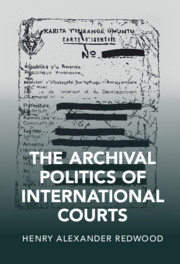Book contents
- The Archival Politics of International Courts
- Cambridge Studies in Law and Society
- The Archival Politics of International Courts
- Copyright page
- Contents
- Acknowledgements
- Abbreviations
- Chapter One The Politics of Archival Knowledge in International Courts
- Chapter Two The International Criminal Tribunal for Rwanda and Its Archive
- Chapter Three The Force of Law
- Chapter Four Contesting the Archive
- Chapter five Reconstituting Justice
- Chapter Six Imagining Community
- Chapter Seven The Residual Mechanism and the Archive
- Conclusion: The ICTR’s Archive
- Bibliography
- Index
- Cambridge Studies in Law and Society
Chapter Two - The International Criminal Tribunal for Rwanda and Its Archive
Published online by Cambridge University Press: 13 August 2021
- The Archival Politics of International Courts
- Cambridge Studies in Law and Society
- The Archival Politics of International Courts
- Copyright page
- Contents
- Acknowledgements
- Abbreviations
- Chapter One The Politics of Archival Knowledge in International Courts
- Chapter Two The International Criminal Tribunal for Rwanda and Its Archive
- Chapter Three The Force of Law
- Chapter Four Contesting the Archive
- Chapter five Reconstituting Justice
- Chapter Six Imagining Community
- Chapter Seven The Residual Mechanism and the Archive
- Conclusion: The ICTR’s Archive
- Bibliography
- Index
- Cambridge Studies in Law and Society
Summary
This traces the UN’s involvement in Rwanda from the build-up to the genocide to the creation of the tribunal and the archive. It examines why, having been willing to stand by during the genocide, an international court came to be seen as a solution to the genocide, and what this reveals about the politics and purpose of the archive. I argue that the introduction of the legal terminology of ‘genocide’ during the violence was a key turning point in the UN’s intervention, as the violence became something that targeted the international community as a whole. The chapter also offers a brief overview of the ICTR and the archive, and here shows that, at the start of the tribunal, a very broad set of strategies underpinned the archive and emphasised the tribunal’s role in determining individual responsibility, establishing the truth, providing a space for victims to testify and reconcile with their pasts, and contribute to the development of international criminal law and international peace and security.
- Type
- Chapter
- Information
- The Archival Politics of International Courts , pp. 30 - 53Publisher: Cambridge University PressPrint publication year: 2021

